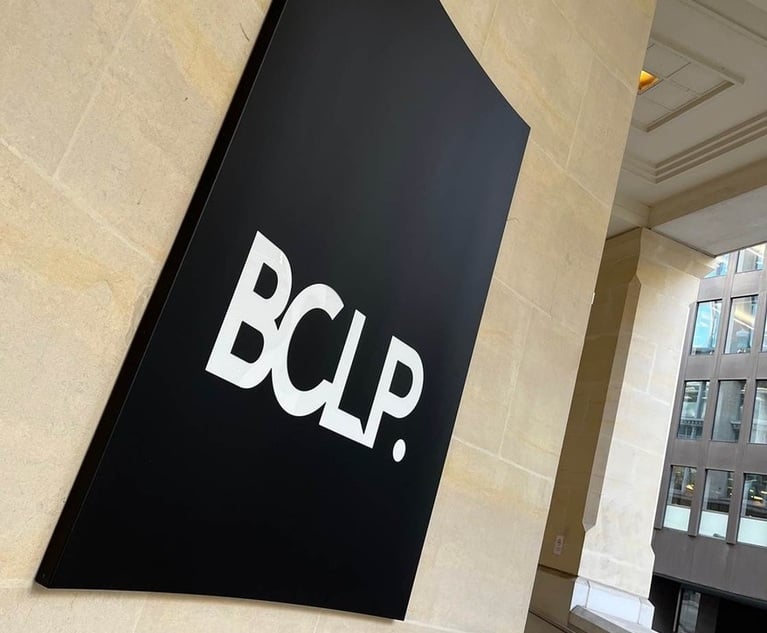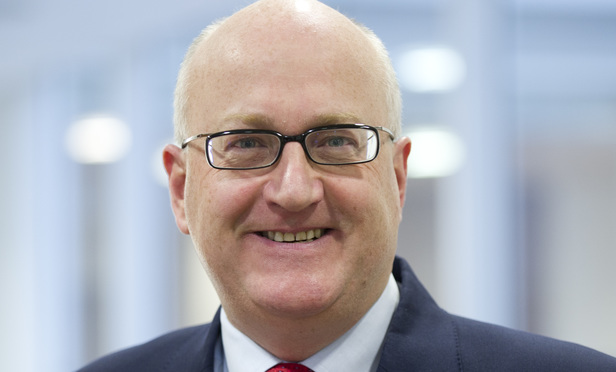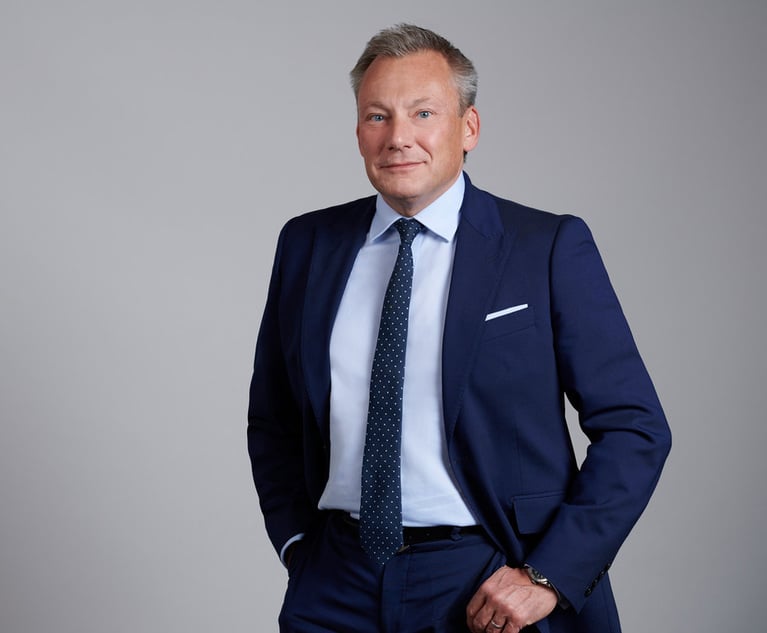Pinsent Masons posts 6% rise in turnover as firm cites impact of sustained investment
Ring-fencing, digital disruption and Brexit drive step change for firm's financial services practice
June 25, 2018 at 04:33 AM
4 minute read
Pinsent Masons has posted a 6% turnover rise for 2017-18, after a year in which Brexit-related work helped drive what managing partner John Cleland described as a "step change" for the firm's financial services practice.
Pinsents saw global turnover rise from £423.1m to £449.8m, alongside a 4.4% increase in profit per equity partner (PEP) to £653,000, as well as a 10% increase in fees billed.
The firm said 90% of its global revenues were generated from clients operating within the firm's five key global sectors – advanced manufacturing and technology, financial services, infrastructure, energy and real estate – up from 85% in 2016-17.
After an 11% revenue rise in 2016-17, this year's uptick in turnover represents a slight levelling-off, but Cleland said he was satisfied with the results, which reflect a sustained period of investment across the firms global offices, most notably in Germany, Australia, Ireland and Spain.
In August 2017, following its move into the Australian market in 2015, the firm recruited four construction and engineering partners from Norton Rose Fulbright for its new base in Perth.
Meanwhile, in Dublin, it launched a technology and financial services practice, and in Madrid expanded its partnership to 10. In May this year, the firm brought in Eversheds Sutherland Middle East infrastructure and energy partners Tim Armsby and Gurmeet Kaur. Overall, during the past 12 months the firm has promoted 23 lawyers to partner and made 30 lateral hires across its 24 offices around the world.
Cleland said that improving profitability during a period of heavy investment was an "excellent result".
"The aim is to be an international market leader in our five global sectors, and we seek to grow across all of these sectors. Our growth so far has been driven internationally, especially in Germany and Australia," he said. "Over five years, we have achieved 40% turnover growth and 60% profit growth. It's been pleasing to push the numbers in the right direction while continuing to expand."
Recent developments – such as the introduction of MiFID II earlier this year, alongside the looming Brexit deadline – have been a boon for the firm, generating disputes and transactional work, particularly within financial services.
"Each of the five sectors has experienced growth. But, owing to ring-fencing, digital disruption and Brexit, financial services has undergone a step change. And we've seen a lot of work out of this – our revenues have improved 20% year-on-year," said Cleland.
On navigating such unknowns as Brexit, he added: "For us, we tend to look after things that are important to us and hope that that feeds into our growth and profitability. It's about continuing to do the things we're good at and doing them well, but also anticipating the direction of the market where we can."
The past year has seen the firm take lead roles in matters such as the investigation into the data breach at Dixons Carphone, and advising the BBC on its settlement with Appleby over the 'Paradise Papers' leaks. And in May, EDF Energy reappointed the firm to its UK legal panel, despite cutting the number of firms from 14 to eight.
Cleland also pointed to areas outside of the five global sectors that he sees as equally essential to the firm's overall growth strategy.
"There has been a real appetite for developing new law services – demonstrated by our acquisition of diversity and inclusion consulting company Brook Graham, as well as our expansion of [flexible lawyering service] Vario into Australia and Singapore – and we've invested in both of these services.
"We've also brought in new colleagues, including data analysts and computer scientists. It really reflects a change in the make-up of our workforce. It shows how our services have extended far beyond black letter law."
Since becoming managing partner in 2015, Cleland has overseen a £67.5m increase in total global growth from £382.3m to £449.8m.
On his expectations for the next 12 months, he said: "We expect to bring in new clients across all of our sectors, in all of our offices. For example, our offices in Madrid and Dublin will enable us to attract new and different types of clients. We will also look to continue taking advantage of our expansions into Germany and Australia."
This content has been archived. It is available through our partners, LexisNexis® and Bloomberg Law.
To view this content, please continue to their sites.
Not a Lexis Subscriber?
Subscribe Now
Not a Bloomberg Law Subscriber?
Subscribe Now
NOT FOR REPRINT
© 2025 ALM Global, LLC, All Rights Reserved. Request academic re-use from www.copyright.com. All other uses, submit a request to [email protected]. For more information visit Asset & Logo Licensing.
You Might Like
View All
Jones Day Names New Practice Leaders in Brussels, Latin America and the US

Lawyers React To India’s 2025 Budget, Welcome Investment And Tax Reform

BCLP Joins Crowded Saudi Legal Market with Plans to Open Two Offices
3 minute readTrending Stories
- 1States Accuse Trump of Thwarting Court's Funding Restoration Order
- 2Microsoft Becomes Latest Tech Company to Face Claims of Stealing Marketing Commissions From Influencers
- 3Coral Gables Attorney Busted for Stalking Lawyer
- 4Trump's DOJ Delays Releasing Jan. 6 FBI Agents List Under Consent Order
- 5Securities Report Says That 2024 Settlements Passed a Total of $5.2B
Who Got The Work
J. Brugh Lower of Gibbons has entered an appearance for industrial equipment supplier Devco Corporation in a pending trademark infringement lawsuit. The suit, accusing the defendant of selling knock-off Graco products, was filed Dec. 18 in New Jersey District Court by Rivkin Radler on behalf of Graco Inc. and Graco Minnesota. The case, assigned to U.S. District Judge Zahid N. Quraishi, is 3:24-cv-11294, Graco Inc. et al v. Devco Corporation.
Who Got The Work
Rebecca Maller-Stein and Kent A. Yalowitz of Arnold & Porter Kaye Scholer have entered their appearances for Hanaco Venture Capital and its executives, Lior Prosor and David Frankel, in a pending securities lawsuit. The action, filed on Dec. 24 in New York Southern District Court by Zell, Aron & Co. on behalf of Goldeneye Advisors, accuses the defendants of negligently and fraudulently managing the plaintiff's $1 million investment. The case, assigned to U.S. District Judge Vernon S. Broderick, is 1:24-cv-09918, Goldeneye Advisors, LLC v. Hanaco Venture Capital, Ltd. et al.
Who Got The Work
Attorneys from A&O Shearman has stepped in as defense counsel for Toronto-Dominion Bank and other defendants in a pending securities class action. The suit, filed Dec. 11 in New York Southern District Court by Bleichmar Fonti & Auld, accuses the defendants of concealing the bank's 'pervasive' deficiencies in regards to its compliance with the Bank Secrecy Act and the quality of its anti-money laundering controls. The case, assigned to U.S. District Judge Arun Subramanian, is 1:24-cv-09445, Gonzalez v. The Toronto-Dominion Bank et al.
Who Got The Work
Crown Castle International, a Pennsylvania company providing shared communications infrastructure, has turned to Luke D. Wolf of Gordon Rees Scully Mansukhani to fend off a pending breach-of-contract lawsuit. The court action, filed Nov. 25 in Michigan Eastern District Court by Hooper Hathaway PC on behalf of The Town Residences LLC, accuses Crown Castle of failing to transfer approximately $30,000 in utility payments from T-Mobile in breach of a roof-top lease and assignment agreement. The case, assigned to U.S. District Judge Susan K. Declercq, is 2:24-cv-13131, The Town Residences LLC v. T-Mobile US, Inc. et al.
Who Got The Work
Wilfred P. Coronato and Daniel M. Schwartz of McCarter & English have stepped in as defense counsel to Electrolux Home Products Inc. in a pending product liability lawsuit. The court action, filed Nov. 26 in New York Eastern District Court by Poulos Lopiccolo PC and Nagel Rice LLP on behalf of David Stern, alleges that the defendant's refrigerators’ drawers and shelving repeatedly break and fall apart within months after purchase. The case, assigned to U.S. District Judge Joan M. Azrack, is 2:24-cv-08204, Stern v. Electrolux Home Products, Inc.
Featured Firms
Law Offices of Gary Martin Hays & Associates, P.C.
(470) 294-1674
Law Offices of Mark E. Salomone
(857) 444-6468
Smith & Hassler
(713) 739-1250










